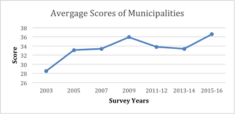An international survey of city websites has identified Seoul, South Korea, as the top-ranked city in the performance of municipal e-governance for the years 2015-16. The survey evaluated the performance of websites of municipalities worldwide for privacy and security, usability, content, services, and citizen and social engagement, and ranked the cities on a global scale. The research study was conducted jointly by the E-Governance Institute in the School of Public Affairs and Administration (SPAA) at Rutgers University-Newark and the Department of Public Policy and Public Affairs, John W. McCormack Graduate School of Policy and Global Studies at the University of Massachusetts, Boston, and was co-sponsored by the Public Technology Institute (PTI). The study identified the following top-ranked cities in municipal e-governance for the years 2015-16.
Top 10 Cities in Digital Governance Worldwide – 2015-16
Rank | City | Score |
1 | Seoul | 79.92 |
2 | Helsinki | 69.84 |
3 | Madrid | 69.24 |
4 | Hong Kong | 67.56 |
5 | Prague | 66.48 |
6 | Tallinn | 62.10 |
7 | New York | 62.02 |
8 | Bratislava | 60.34 |
9 | Yerevan | 59.61 |
10 | Vilnius | 59.12 |
As governments across the world increasingly offer their services online, studies evaluating the performance of such online services (broadly referred to as “e-governance”) primarily focus on federal, state, and local governments in the United States. Only a few studies have produced comparative analyses of e-governance in municipalities worldwide. This particular e-governance survey, first conducted in 2003 and repeated every two years, represents a continued effort to evaluate e-governance in large municipalities globally. The study systematically utilizes the comprehensive Rutgers E-Governance Performance Index by classifying 104 measures into five categories: privacy, usability, services, content, and citizen and social engagement. Evaluating each municipality’s website in its native language to examine how the local constituency perceives their government online, the survey highlights the strengths and weaknesses of each municipality in terms of the five subject areas, and then ranks the municipalities on an overall basis and within each category.
The e-governance study highlights an improved focus on usability, as the percentage of cities with official websites increased significantly around the world. Oceania was the top-ranked continent, followed by Europe and Asia. The top-ranked cities for each continent are Johannesburg (Africa), Seoul (Asia), Helsinki (Europe), New York (North America), Auckland (Oceania), and Buenos Aires (South America). The overall average score for all municipalities worldwide was 36.57, a sharp increase from 33.37 in 2013-14. The below figure shows the longitudinal increase in the average scores since 2003.

Seoul retains its top ranking in municipal e-governance, similar to the previous six surveys conducted since 2003. The city also ranked first in the categories of content, services, and citizen and social engagement. Seoul provides innovative online technologies for citizens to communicate suggestions and participate in the policy process, along with enabling public administrators and elected officials to respond directly to citizens. The website also continues to act as a leading example of privacy protection and Internet security. Helsinki was ranked 2nd in the survey, increasing significantly from #16 in the previous 2013-14 survey. The home page of the Helsinki website is user-friendly, interactive, and enables citizen engagement with public officials through social media platforms. That website addresses privacy and security concerns of its users through comprehensible privacy policies that are clearly understandable by users.
The city of Madrid follows in the 3rd position as a function of high scores in services, citizen and social engagement, and excellent content organization and design. Madrid has a dedicated tax paying system online that users can utilize through a personal account, and the web portal enables easy online payments for various purposes. The website also allows citizens to engage public officials and government departments through online forums to discuss policy issues. The website of Hong Kong is ranked 4th in the survey, and scores high in usability and service delivery, which is evidenced by its “one-stop” service platform. The website performs well in protecting users’ privacy, and also provides various platforms for citizen participation online. The city of Prague website is ranked 5th with high scores in privacy, content and citizen and social engagement. The website contains clear and understandable informational content, and uses an integrated approach to citizen participation, along with providing valuable performance measurement information with targets and benchmarks.
According to Dr. Marc Holzer, University Professor, School of Public Affairs and Administration and Director of the E-Governance Institute at Rutgers University-Newark: “The E-Governance Performance Index used for the survey is a set of benchmarks that spotlight high levels of performance throughout the world and foster high expectations for improved web-based municipal service delivery in the near future, in all countries. Administering the survey in the native languages helped to reduce cultural bias in the survey methodology.”
According to Dr. Aroon P. Manoharan, Associate Professor, University of Massachusetts-Boston: “Our study identifies global best practices in multiple dimensions of e-governance and examines performance from a longitudinal perspective. The results enable practitioners to promote the comparison and sharing of municipal best practices, particularly as nations are beginning to develop smart cities which integrate municipal functions and services to the information technology framework.”
Average Score of Cities by Continent

The continued study of municipalities worldwide will further provide insights into the direction of e-governance and the performance of e-governance throughout the regions of the world. The E-Governance Institute is a program of the School of Public Affairs and Administration (SPAA), Rutgers University-Newark, which U.S. News & World Report ranked 7th in information and technology among graduate programs in public affairs in the United States, and 13th overall in public administration and management. Rutgers SPAA and the John W. McCormack Graduate School of Policy and Global Studies at UMass Boston were recently ranked among the top 50 Most Innovative Public Service Schools in the United States. The worldwide survey continues to be co-sponsored by the Public Technology Institute (PTI), a global leader in public technology that actively supports local government executives and elected officials through research, education, executive-level consulting services, and national recognition programs.
For more information regarding this study, contact Dr. Marc Holzer at mholzer@rutgers.edu or Dr. Aroon P. Manoharan at aroon.manoharan@umb.edu. Printed copies can be purchased via Amazon at: https://www.amazon.com/Digital-Governance-Municipalities-Worldwide-2015-2016/dp/1537555960. Visit the E-Governance Institute’s website at http://spaa.newark.rutgers.edu/egov to access the latest reports, articles, and publications on the best practices of e-governance around the world.
About Rutgers University-Newark School of Public Affairs and Administration
http://spaa.newark.rutgers.edu
The School of Public Affairs and Administration (SPAA) at Rutgers University-Newark educates and motivates students to choose careers in public service and administration through its innovative and highly ranked undergraduate and graduate degrees and professional and graduate certificate programs. Rutgers SPAA’s faculty generates knowledge and best practices in public affairs and administration, and collaborates with public and nonprofit organizations and professionals throughout the U.S. and the world. Guided by the principles of knowledge, competence, diversity, service, and ethics – with an emphasis on public service values and competencies for effective performance – SPAA promotes accountability, transparency, and performance in the public and nonprofit sectors. Rutgers SPAA is highly ranked by U.S. News & World Report and is accredited by NASPAA – the Network of Schools of Public Policy, Affairs, and Administration, as well as being the first U.S. school to earn full international accreditation from ICAPA – The International Commission on Accreditation of Public Administration Education and Training Programs.


